

WEGMANN automotive - Tradition since 1882
-
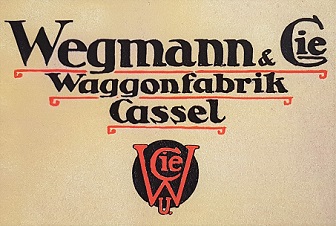
Founding year 1882
Councillor of commerce Peter Wegmann founds the "Casseler Waggonfabriken von Wegmann, Harkort & Co." with Richard Harkort. As early as January 1883, the young company can start production with 210 workers. First, 24 iron coal wagons leave the factory gates in May. This is followed by open and covered freight and tank cars as well as the first passenger cars. The 1,000th rail vehicle, a four-axle saloon car, is delivered to Spain in 1885.
1882
-
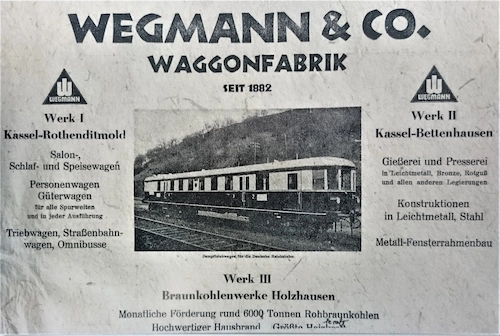

Wegmann & Co.
In 1886, the company is renamed Wegmann & Co. In this year 520 workers already produce 677 wagons. 15 years later, this number is to rise to 1,500.
1886 -
![Forge from WEGMANN [Translate to English GB:] Schmiede von WEGMANN](/fileadmin/user_upload/WEGMANN_automotive/Company/Tradition/WEGMANN-Schmiede.jpg)
Anniversary year
"Everything from a single source" is the production motto. Not only blacksmiths, locksmiths, turners, drillers and riveters, but also carpenters, painters and even saddlers are part of the 1,000-strong workforce in the anniversary year of 1907. Together with the wagon factory Gebrüder Credé & Co. Wegmann & Co. now holds a market share of 10% of the total German production of railway wagons after 25 years.
1907![Forge from WEGMANN [Translate to English GB:] Schmiede von WEGMANN](/fileadmin/user_upload/WEGMANN_automotive/Company/Tradition/WEGMANN-Schmiede.jpg)
-
![Certificate of procuration [Translate to English GB:] Bescheinigung der Prokura](/fileadmin/user_upload/WEGMANN_automotive/Company/Tradition/Prokura-Bode-1912.jpg)
![Certificate of procuration [Translate to English GB:] Bescheinigung der Prokura](/fileadmin/user_upload/WEGMANN_automotive/Company/Tradition/Prokura-Bode-1912.jpg)
August Bode as Managing Director
When company founder Peter Wegmann died unexpectedly in 1912 and the shareholders were looking for a successor, 37-year-old August Bode was appointed managing director in charge of the entire technical department. He had joined the wagon factory on 1 May 1889 as a highly motivated apprentice. Conrad Köhler is responsible for the commercial side of the business.
1912 -
![Food distribution to the employees of WEGMANN [Translate to English GB:] Essensausgabe an die Mitarbeiter von WEGMANN](/fileadmin/user_upload/WEGMANN_automotive/Company/Tradition/WEGMANN-Essensausgabe-1907.jpg)
First World War and Post-War Period
Bode and Köhler steer the company through the war and hunger years of the post-war years. The 1920s are characterised by high interest rates, which make investment difficult. It is not uncommon for employees to be paid in kind according to the principle of "sugar instead of wage packet".
1920s![Food distribution to the employees of WEGMANN [Translate to English GB:] Essensausgabe an die Mitarbeiter von WEGMANN](/fileadmin/user_upload/WEGMANN_automotive/Company/Tradition/WEGMANN-Essensausgabe-1907.jpg)
-
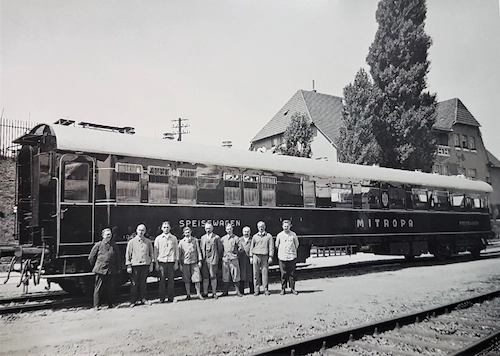

MITROPA dining coaches
Between 1927 and 1929, MITROPA (Mitteleuropäische Schlaf- und Speisewagen Aktiengesellschaft) increases its stock of dining cars due to increased demand. Wegmann & Co. produces the fourth and last batch of the WR-4ü series. The dining cars are to be used in 1st and 2nd class long-distance express trains.
1927 -
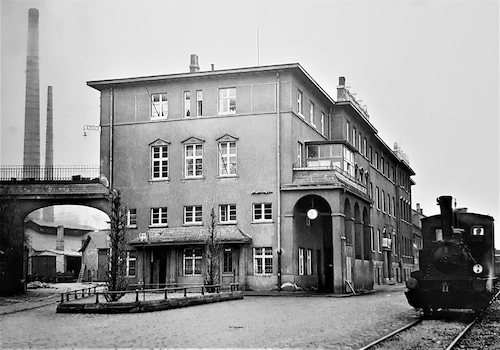
World Economic Crisis and Second World War
August Bode's sons grow into difficult times: the global economic crisis quickly replaces the Golden Twenties. With falling demand, industrial production in Germany falls by almost half until 1932. With the National Socialist takeover and the start of the war, the entrepreneurial scope for decision-making is restricted. After numerous bombing, in 1945 the factory lies in ruins.
1930
-
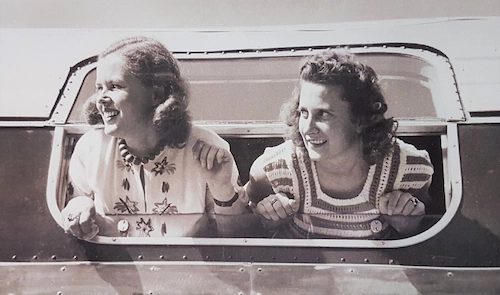

Double-decker car
On the upper deck you can enjoy the best view: the 2nd class double-decker sets new standards. One year later, three further versions with a length of 26.4m follow - the longest passenger coaches ever built in series.
1950 -
![Car transport trolley from WEGMANN [Translate to English GB:] Autotransportwagen von WEGMANN](/fileadmin/user_upload/WEGMANN_automotive/Company/Tradition/WEGMANN-Autotransportwagen-1956.jpg)
Reconstruction and succession
At the age of 70, August Bode faces the greatest challenge of his professional life: Together with his two sons, he rebuilds the destroyed facilities. As senior manager he gives the company important impulses and leads it into the flourishing 1950s.
In the mid-1950s, travelling during the holidays becomes an affordable pastime. Those who can afford it are saving up in their own car - a serious competition for the railway industry. Wegmann & Co. sees this change as an opportunity: The "Reisezug-Doppelstock-Gepäck- und Autotransportwagen" is born and with it the idea of putting the car on the market as "luggage" for higher demands. In the upper deck there is space for 5 cars, in the lower deck for 2 cars, another one can fit on the lifting platform. When August Bode dies in 1960, his sons Dr. Engelhard and Fritz Bode take over the management of the company and turn it into a high-tech company.
1950s![Car transport trolley from WEGMANN [Translate to English GB:] Autotransportwagen von WEGMANN](/fileadmin/user_upload/WEGMANN_automotive/Company/Tradition/WEGMANN-Autotransportwagen-1956.jpg)
-
![Tea trolley from WEGMANN [Translate to English GB:] Tee-Wagen von WEGMANN](/fileadmin/user_upload/WEGMANN_automotive/Company/Tradition/WEGMANN-exklusive-zuege.jpg)
![Tea trolley from WEGMANN [Translate to English GB:] Tee-Wagen von WEGMANN](/fileadmin/user_upload/WEGMANN_automotive/Company/Tradition/WEGMANN-exklusive-zuege.jpg)
Split of the company and recent history
Eight years later, the company is split into two independent companies - Wegmann & Co. and Gebrüder Bode & Co. In 1979 Wegmann & Co. is passed on to the sons of Fritz Bode, Manfred and Wolfgang Bode.
1979
Versatility and progress
Founded in 1882 as a wagon construction company, today the WEGMANN Group is a group of companies that sets global standards with three business units as market and technology leaders: Krauss-Maffei Wegmann GmbH & Co. KG is a German-French joint venture of the security and defense industry; Schleifring GmbH on the other hand works as a system supplier for non-contact data and power transmission in the medical, radar, wind power and mechanical engineering industries; finally WEGMANN automotive GmbH with its precision manufacturing of balancing weights, valves and other products has a big role in the automotive aftermarket.